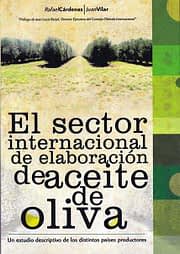 El Sector Internaciónal De Elaboración de Aceite de Oliva, or The International Olive Oil Production Sector, by Juan Vilar Hernández is a descriptive study of different olive oil producing countries and one of the most comprehensive books written so far on the olive oil sector. The book provides an overview of the current state of olive growth and olive oil production in the 41 countries that now produce olive oil worldwide.
El Sector Internaciónal De Elaboración de Aceite de Oliva, or The International Olive Oil Production Sector, by Juan Vilar Hernández is a descriptive study of different olive oil producing countries and one of the most comprehensive books written so far on the olive oil sector. The book provides an overview of the current state of olive growth and olive oil production in the 41 countries that now produce olive oil worldwide.
Beginning with an overview of the history and culture of the olive tree and their relationship with man as far back as the beginning of civilization, the book shows the importance of the industry historically as well as illustrating its magnitude in current times.
There’s a description of the global olive sector, continent by continent, for all of the current olive oil producing countries, including the types of crops, their potential for growth, risks, and productive assets.
The book, which was co-written by José Rafael Garcia Cárdenas, was presented at the International Olive Growing Conference held this year in Jaén, Spain where the authors expressed great confidence in the olive sector and predicted a promising future due to continuing growth in production levels and olive grove acreage, and an increasing demand for olive oil worldwide.
The worldwide turnover for the olive sector according to the book, averages between €8.5 and €10.6 billion ($11.1bn — $13.8bn)per year, provides employment for over 30 million people and produces around 3 million tons annually from 34,000 mills. Cárdenas and Hernández have expressed a belief that the industry will only continue to grow, predicting an increased output to 3.7 million tons by 2015.
University of Jaén Rector Manuel Parras Rosa and Juan Vilar Hernández, author of “El Sector Internaciónal De Elaboración de Aceite de Oliva”
Both authors are heavily involved in the olive oil industry; one is the CEO and the other the Technical Director of GEA Wesfalia Separator Ibérica, a leading supplier of mechanical separating equipment to olive oil mills. Both authors drew on their experience in the industry to create the comprehensive book, and Cárdenas announced the publication also serves as part of a doctoral thesis on the global competitiveness of the olive industry.
The book has been praised by the director of the International Olive Council (IOC), Jean-Louis Barjol, who stressed the accuracy and quality of the data, documents and sources used.
For those who have an interest in the current situation of the global olive sector, as well as the status of traditionally producing countries, such as Spain, in comparison to new producers, this book is recommended.









